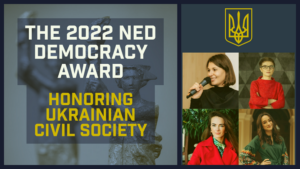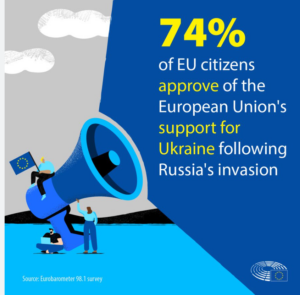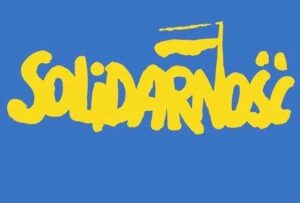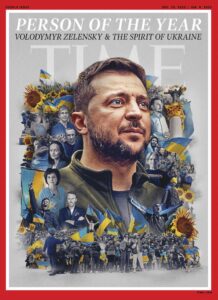Representatives of Ukraine have received the European Parliament’s 2022 Sakharov Prize for Freedom of Thought on behalf of “the brave people of Ukraine” amid their battle to repel invading Russian forces, VOA reports:
The annual prize, named after the Soviet physicist and dissident Andrei Sakharov, was established in 1988 to honor individuals and organizations defending human rights and fundamental freedoms….Several Ukrainian nationals represented their country at the ceremony, including a veteran volunteer Yulia “Taira” Payevska; the Mayor of the Russian-occupied city of Melitopol, Ivan Fedorov; and human rights defender Oleksandra Matviychuk; and others. The award comes with a prize of $53,240, which will be given to representatives of Ukraine’s civil society.
 Since the conflict in Ukraine flared, Ukrainian President Volodymyr Zelensky and his allies have insisted their battle is part of a larger civilizational struggle, pitting their liberal aspirations and fledgling democracy against the tyranny and authoritarianism embodied by Russian President Vladimir Putin’s Russia, The Post’s Ishaan Tharoor observes.
Since the conflict in Ukraine flared, Ukrainian President Volodymyr Zelensky and his allies have insisted their battle is part of a larger civilizational struggle, pitting their liberal aspirations and fledgling democracy against the tyranny and authoritarianism embodied by Russian President Vladimir Putin’s Russia, The Post’s Ishaan Tharoor observes.
“We are dealing with a powerful state that is pathologically unwilling to let Ukraine go,” Zelensky told Time’s Simon Shuster, suggesting that the Kremlin could not countenance a Ukraine that rejected its sphere of influence. “They see the democracy and freedom of Ukraine as a question of their own survival.”
Some 74% of EU citizens approve of the European Union’s support for Ukraine following Russia’s invasion, according to the European Parliament’s Autumn 2022 Eurobarometer survey, published today.
 In all EU Member States, a majority of citizens approve of the EU’s support, with highest support levels shown in Sweden (97%), Finland (95%), the Netherlands (93%), Portugal (92%), and Denmark (92%). Ten months into the war in Ukraine, support for the concrete measures taken by the EU – such as sanctions against the Russian government or financial, military or humanitarian support to Ukraine – continues to be equally high at 73%.
In all EU Member States, a majority of citizens approve of the EU’s support, with highest support levels shown in Sweden (97%), Finland (95%), the Netherlands (93%), Portugal (92%), and Denmark (92%). Ten months into the war in Ukraine, support for the concrete measures taken by the EU – such as sanctions against the Russian government or financial, military or humanitarian support to Ukraine – continues to be equally high at 73%.
American officials are turning to everything from blockchain technology to Ukrainian soldiers for help as they struggle to track the billions of dollars in U.S. weapons and other aid flowing into Ukraine, according to a State Department cable obtained by POLITICO:
The Sept. 6 cable from the U.S. Embassy in Kyiv is blunt in describing the challenges facing U.S. officials trying to watch every penny as Russian drones and missiles bombard Ukrainian cities. There are, for instance, severe limits on the number of American officials in the field and a number of security constraints on their movements. It’s also hard to find contractors willing to work in high-risk regions or set up in-person meetings with government officials, civil society leaders and others receiving the aid, the document states.
The Supervising and Monitoring Ukraine’s Reconstruction Funds (SMURF) project aims to empower Ukraine’s ‘second line of defence’ – civil society and investigative journalists, the Royal United Services Institute reports. The initiative – supported by the National Endowment for Democracy (NED) – gathers the expertise and tools that will enable it to monitor the proper allocation of funds and discourage kleptocracy and corruption.
 The outlook of Poland’s Solidarity’s movement has gained fresh relevance, as Russia is conducting a genocidal war in Ukraine, notes Carl Gershman, the NED’S founding President. Solidarity’s international perspective, known as the “eastern policy,” was conceived and elaborated in the emigré journal Kultura edited by Jerzy Giedroyc, he writes for American Purpose:
The outlook of Poland’s Solidarity’s movement has gained fresh relevance, as Russia is conducting a genocidal war in Ukraine, notes Carl Gershman, the NED’S founding President. Solidarity’s international perspective, known as the “eastern policy,” was conceived and elaborated in the emigré journal Kultura edited by Jerzy Giedroyc, he writes for American Purpose:
Developed during the darkest and seemingly most hopeless years of the Cold War, the “eastern policy” anticipated in an astonishing way the collapse of the Soviet Union and envisioned a new way of understanding how Poland ought to defend its independence and security in the modern world. It was based upon the principles of open frontiers, the renunciation of territorial claims against neighboring countries, and respect for minority rights.
The basic thrust of this thread of the Solidarity movement was that there could be no independent and democratic Poland without an independent and democratic Ukraine, Belarus, and Lithuania, Gershman adds. That seems self-evident today, but it was a revolutionary idea when it was first conceived.
 Western support for Kyiv is holding, no matter fears over war fatigue of many countries that was deepened by the wider economic impact of the war and the energy sanctions placed on Russia’s economy, The Post reports.
Western support for Kyiv is holding, no matter fears over war fatigue of many countries that was deepened by the wider economic impact of the war and the energy sanctions placed on Russia’s economy, The Post reports.
“Among the many miscalculations that Putin has made is his bet that the invasion of Ukraine would strain relations among his adversaries,” wrote German Chancellor Olaf Scholz in a recent op-ed for Foreign Affairs. “In fact, the reverse has happened: the EU and the transatlantic alliance are stronger than ever before.”
The late Nadia Diuk, who oversaw NED’s programs in that region for more than three decades, always stressed something she had heard the Polish dissident Jacek Kuroń declare at a large meeting in Warsaw in the autumn of 1980: “Without a free Ukraine, there cannot be a free Poland,” Gershman adds:
In the 1980s, Poland was the epicenter of the global struggle for democracy, and its victory transformed the world. Today it is Ukraine that is the epicenter of this struggle, and its battle to prevail against Putin’s desperate attempt to restore the Russian Empire could have an equally transformative effect. RTWT
A version of this statement was first delivered to the Polish Senate on the 40th anniversary of the establishment of the Temporary Coordinating Committee, the underground leadership of NSZZ Solidarity.
The #SMURF project aims to empower #Ukraine’s ‘second line of defense’ – civil society and investigative journalists – with @NEDemocracy support, @RUSI_org reports. https://t.co/6Faybj8gdC
— Democracy Digest (@demdigest) December 14, 2022







